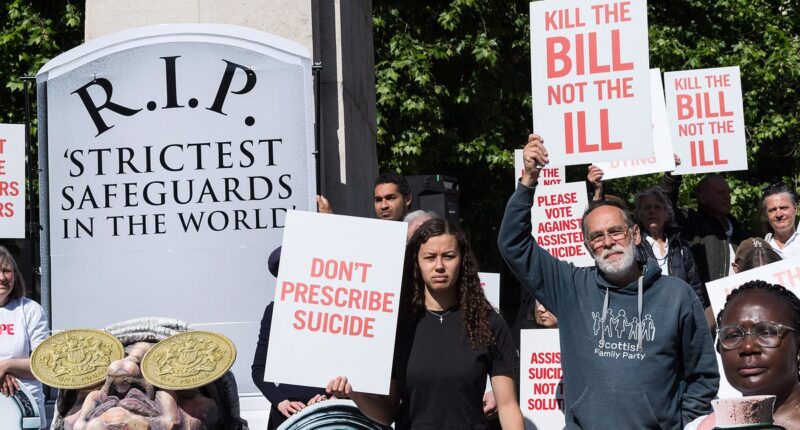Labour support for legalising assisted dying appears to be falling as more MPs publicly question the law change.
The Commons will next week debate changes to the plan to allow terminally ill people with less than six months to live to end their own lives, ahead of a crunch vote later this month.
But fresh concerns have been raised about the The Terminally Ill Adults (End of Life) Bill that is being led through Parliament by backbencher Kim Leadbeater.
Opponents have complained the Bill does not have enough protections and has been rushed through, with the criticism coming days after two royal medical colleges voiced their doubts on the legislation in its current form.
And now even supporters of the principle of legalising assisted dying are questioning the process.
Labour MP Markus Campbell-Savours, who voted for the bill in a preliminary vote last year, told the BBC he now planned to vote against it because in its current form it crossed his ‘red lines for protecting the vulnerable’.
‘I want to see safeguards that will ensure that assisted dying is not overextended to include those in situations where there are alternative ways to improve the quality of their lives,’ said Campbell-Savours.
‘I would also be very concerned if legislation produced a situation where people who considered themselves a burden on their families and friends felt pressured to end their life.’

The Commons will next week debate changes to the law allowing terminally ill people with less than six months to live to end their own lives, ahead of a crunch vote later this month.

But fresh concerns have been raised about the The Terminally Ill Adults (End of Life) Bill that is being led through Parliament by backbencher Kim Leadbeater (centre).

Labour MP Markus Campbell-Savours, who voted for the bill in a preliminary vote last year, told the BBC he now planned to vote against it because in its current form it crossed his ‘red lines for protecting the vulnerable’.
And fellow Labour MP Josh Fenton-Glynn told the broadcaster he will vote against the bill, having abstained last year.
‘We see quite a few of the amendments which are specifically aimed at stopping coercion being opposed by the supporters of the bill,’ he said.
‘I don’t think chances to make the bill safer have been taken.’
At the end of November last year, the Commons backed the Terminally Ill Adults (End of Life) Bill by 330 votes to 275, a majority of 55 votes.
But campaigners believe enough have changed their mind to put its chances of becoming law onto a knife-edge.
The proposed legislation would allow terminally ill adults in England and Wales, with fewer than six months to live, to apply for an assisted death.
This would be subject to approval by two doctors and a panel featuring a social worker, senior legal figure and psychiatrist.
The terminally ill person would take an approved substance, provided by a doctor but administered only by the person themselves.
The implementation period has been doubled to a maximum of four years from royal assent, rather than the initially suggested two years.
If the Bill was to pass later this year that would mean it might not be until 2029, potentially coinciding with the end of this Government’s parliament, that assisted dying was being offered.
A Government impact assessment published last month estimated that between 164 and 647 assisted deaths could potentially take place in the first year of the service, rising to between 1,042 and 4,559 in year 10.
The establishment of a Voluntary Assisted Dying Commissioner and three-member expert panels would cost an estimated average of between £10.9 million to £13.6 million per year, the document said.
It had ‘not been possible’ to estimate the overall implementation costs at this stage of the process, it added.
While noting that cutting end-of-life care costs ‘is not stated as an objective of the policy’, the assessment estimated that such costs could be reduced by as much as an estimated £10 million in the first year and almost £60 million after 10 years.

















